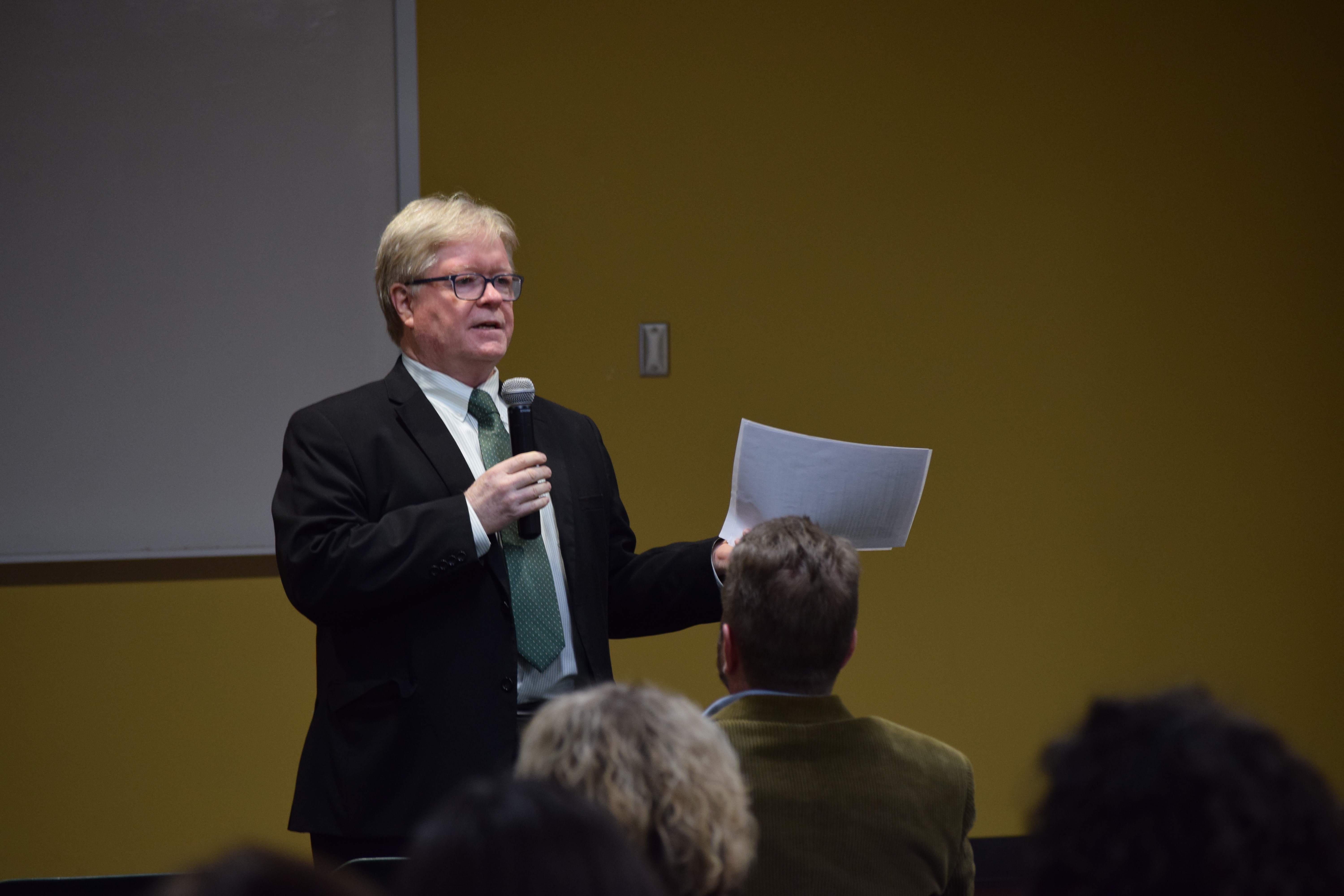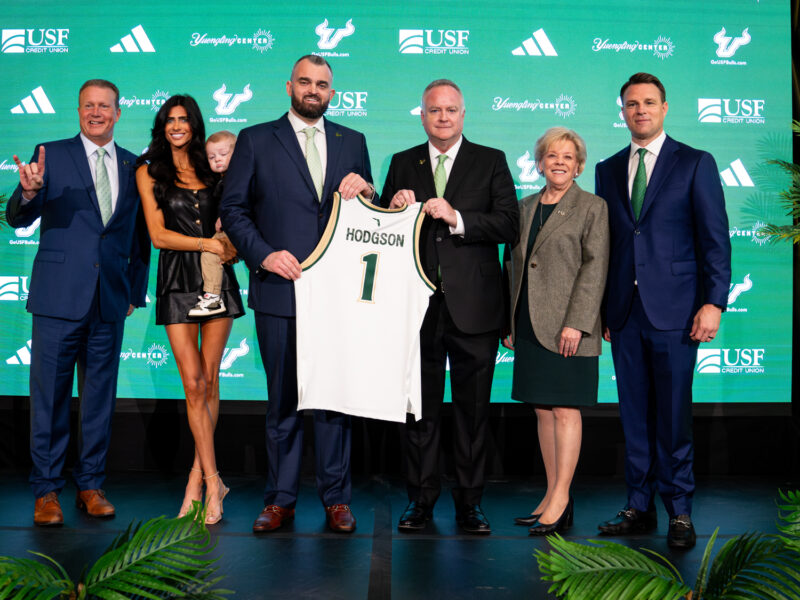Above photo: When pressed by retirees to give his opinion on separate accreditation, interim Regional Chancellor Martin Tadlock said, “I should, but if I did you’d be looking for someone else tomorrow.” Jonah Hinebaugh | The Crow’s Nest
By Jeffrey Waitkevich
Interim Regional Chancellor Martin Tadlock might have accidentally spilled the beans on where he stands on a proposal to abolish the independent accreditation of the St. Petersburg campus.
At a meeting Tuesday with the campus’ Retired Faculty and Staff Association (RFSA), which strongly opposes the proposal, Tadlock was pressed to reveal his opinion.
“I should, but if I did you’d be looking for someone else tomorrow,” he responded. “It’s a tough position to be in for me.”
His comment came at a lunch meeting where Tadlock’s written statement, titled “Why not taking a position is taking a position,” was placed on every table.
Michael Killenberg, the founding director of the USF St. Petersburg journalism department, criticized that position.
“I want you to stand up as the leader of the campus and say, ‘No, this is not what was intended,’” said Killenberg. “I would expect our leaders to stand up and not say that not taking a stand is taking a stand.”
Tadlock first thanked the retirees for voicing their opinions and added that it was something he could not do because he must “walk a very thin line.”
Tadlock acknowledged having concerns upon learning about the legislative proposal in January. He said he drove to Tampa to meet USF System President Judy Genshaft to address those concerns face-to-face.
“She was not disagreeing with me at the time,” he said when asked by retired financial administrator Herman Brames if he had pushed Genshaft to oppose the bill.
Since then, Tadlock’s public stance on the bill – which was buried in the last two pages of a 52-page bill – has been a delicate dance.
In countless meetings with faculty, staff, students and other groups, the interim chancellor has stressed that he is neutral. But he has also cited potential benefits for the St. Petersburg campus and pledged to work to ensure that the campus would have a big role in planning for consolidation.
Tadlock’s awkward position has seemingly become even more uncomfortable as Genshaft’s public stance shifted from neutral to pro-consolidation.
At their meeting Tuesday, the 50 members of the campus retirees group were full of concerns and stood strongly against the bill once again.
Killenberg cited his previous stomping ground as one of his concerns. He asked what would happen to the accredited journalism program at USF St. Petersburg if it was merged with the department at USF Tampa, which isn’t accredited.
“They should close it in Tampa and put it here,” Tadlock replied. “That would be logical.”
Darryl Paulson, an emeritus professor of government at USF St. Petersburg, had quarrels with the lack of transparency, although Genshaft and Brian Lamb, chair of the USF system Board of Trustees, have both pointed to transparency as one of three staples in the consolidation process.
“We have no reason, quite frankly, to trust (USF) Tampa,” Paulson added. “They can’t just say this is a new day and expect us to believe it.”
Winston Bridges, co-chair of the retirees group with Steve Micklo, argued that separate accreditation guaranteed operational authority.
Brames, who attended Indiana University in the ‘60s, pointed to the success schools in the Big 10 have with separate accreditation.
“They aren’t fearful of separate accreditation on regional campuses, then why us?” Brames said.
Ray Arsenault, a history professor whose wife Kathy serves on the RFSA board, relayed the stance of the Faculty Senate.
“The College of Arts and Sciences is in an uproar, in almost unanimous opposition, but that is not the case for the College of Education or the College of Business,” Arsenault said. “We really weren’t able to get a consensus on the Faculty Senate to release a statement the way this organization did.”
Arsenault also said that the St. Petersburg campus, not the Tampa campus, should be the model for achievement, comparing USF Tampa to a factory.
“Get ‘em in. Get ‘em out. Industrial model,” he said.
Tadlock predicted that the proposal, which is in a broad bill on higher education, will win legislative approval, “barring some kind of real shift in thinking.”
He said that there was one “strike” against USF St. Petersburg in the House and another in the board that oversees the state higher education system. That board has endorsed the proposal.
“And three strikes, you’re out,” Killenberg interjected.
“Three strikes and we’re one accredited USF,” Tadlock replied.
On Tuesday, the bill cleared a second legislative hurdle, the House Higher Education Appropriations Subcommittee, on a 13-0 vote. The measure goes next to the House Education Committee.




Well written story. I gave it a thumbs up. But I did not mean to give HB423 a thumbs up. The measure should be postponed at the least. It is not a good idea at all and a huge step backward.